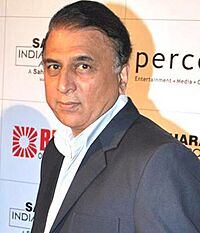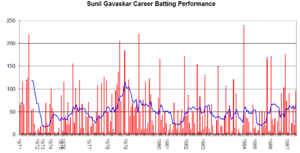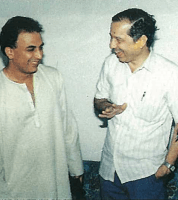Sunil Gavaskar facts for kids
Quick facts for kids
Sunil Gavaskar
|
|||||||||||||||||||||||||||||||||||||||||||||||||||||||||||||||||||||||||||||||||||||||||||||||||||||||||||||||||||||||||||||||||
|---|---|---|---|---|---|---|---|---|---|---|---|---|---|---|---|---|---|---|---|---|---|---|---|---|---|---|---|---|---|---|---|---|---|---|---|---|---|---|---|---|---|---|---|---|---|---|---|---|---|---|---|---|---|---|---|---|---|---|---|---|---|---|---|---|---|---|---|---|---|---|---|---|---|---|---|---|---|---|---|---|---|---|---|---|---|---|---|---|---|---|---|---|---|---|---|---|---|---|---|---|---|---|---|---|---|---|---|---|---|---|---|---|---|---|---|---|---|---|---|---|---|---|---|---|---|---|---|---|---|

Gavaskar in 2012
|
|||||||||||||||||||||||||||||||||||||||||||||||||||||||||||||||||||||||||||||||||||||||||||||||||||||||||||||||||||||||||||||||||
| Sheriff of Mumbai | |||||||||||||||||||||||||||||||||||||||||||||||||||||||||||||||||||||||||||||||||||||||||||||||||||||||||||||||||||||||||||||||||
| In office 1995–1996 |
|||||||||||||||||||||||||||||||||||||||||||||||||||||||||||||||||||||||||||||||||||||||||||||||||||||||||||||||||||||||||||||||||
| Preceded by | I. M. Kadri | ||||||||||||||||||||||||||||||||||||||||||||||||||||||||||||||||||||||||||||||||||||||||||||||||||||||||||||||||||||||||||||||||
| Succeeded by | Subir Kumar Choudhury | ||||||||||||||||||||||||||||||||||||||||||||||||||||||||||||||||||||||||||||||||||||||||||||||||||||||||||||||||||||||||||||||||
|
|||||||||||||||||||||||||||||||||||||||||||||||||||||||||||||||||||||||||||||||||||||||||||||||||||||||||||||||||||||||||||||||||
Sunil Manohar "Sunny" Gavaskar (born 10 July 1949) is a famous former Indian cricket player. He was a captain of the India national cricket team and played for Mumbai from 1971 to 1987. He was the first batsman in Test cricket history to score more than 10,000 runs. Many people consider Gavaskar one of the greatest opening batsmen of all time.
Gavaskar was known for his excellent batting skills, especially against very fast bowlers. He had a high batting average of 65.45 against the West Indies, who had some of the fastest bowlers ever. He also led the Indian team to victory in the 1984 Asia Cup and the World Championship of Cricket in 1985. He also served as the Sheriff of Mumbai.
Sunil Gavaskar has received many awards, including the Arjuna Award and the Padma Bhushan, which are high honors in India. He was added to the ICC Cricket Hall of Fame in 2009. In 2012, he received the C. K. Nayudu Lifetime Achievement Award, the highest award from the BCCI for former players. Fans and commentators often call him "Sunny."
Contents
Early Cricket Days
Sunil Gavaskar was born in Mumbai into a middle-class family. He went to St. Xavier's High School. In 1966, he was named India's Best Schoolboy Cricketer of the Year. In his last year of school, he scored amazing runs like 246 not out, 222, and 85. He even scored a century against a touring team of London schoolboys.
He started playing first-class cricket in 1966–67. He joined Bombay's Ranji Trophy team but did not play a match for two years. He made his official debut in the 1968–69 season. In his second match, he scored 114 runs. After scoring two more centuries, he was chosen for the Indian team to tour the West Indies in 1970–71.
Test Cricket Journey
First Test Win in West Indies
Gavaskar missed the first Test match because of a nail infection. But in the second Test in Port-of-Spain, Trinidad, he scored 65 and 67 not out. He hit the winning runs, helping India get its first-ever win against the West Indies.
First Centuries and Series Victory
He continued his great performance. He scored his first century (116 runs) in the third Test. He then scored 117 not out in the fourth Test. In the fifth Test in Trinidad, he scored 124 and 220 runs. This helped India win its first-ever series against the West Indies. His performance made him the second player to score a century and a double century in the same match. He was also the first Indian to score four centuries in one Test series. He scored 774 runs in that series, which is still the most runs by any batsman in a debut series. A Calypso singer even wrote a song called "Gavaskar Calypso" about him!
Challenges in England
After his amazing start, Gavaskar toured England in 1971. He did not perform as well, scoring only two half-centuries. He was involved in a small controversy when he collided with English bowler John Snow. Some people started to question if he was good enough for international cricket.
Home Series and More Tours
In 1972–73, England visited India. This was Gavaskar's first time playing a Test series at home. He did not score many runs in the first few matches. Later, he scored some runs as India won the series. His first home series was not his best.
When India toured England again in 1974, Gavaskar scored 101 and 58 in the first Test. He scored 227 runs in total, but India lost the series 3–0.
His series against the West Indies in 1974–75 was interrupted. He played only two matches and scored 86 runs in one of them. This match was the start of a world record of 106 consecutive Test appearances for him.
In 1975–76, Gavaskar led India in a Test match for the first time against New Zealand in Auckland. He scored 116 and 35 not out, helping India win. He ended that series with 266 runs. Later, in the West Indies, he scored two centuries in a row (156 and 102). In one match, his 102 helped India chase down a world record score to win.
First Home Test Century
Gavaskar did not score a century in India until November 1976. He scored 119 runs in front of his home crowd in Mumbai, helping India win. He also scored 1000 Test runs in a calendar year, becoming the first Indian to do so.
Success in Australia and Pakistan
In 1977–78, he toured Australia and scored three centuries in a row (113, 127, 118). He finished the series with 450 runs.
In 1978–79, India toured Pakistan for the first time in 17 years. Gavaskar faced Imran Khan, a fast Pakistani bowler, who called him "The most compact batsman I've bowled to." Gavaskar scored 111 and 137 in one match, becoming the first Indian to score two centuries in one Test match twice. He also passed Polly Umrigar to become India's highest Test run-scorer.
Leading the Team
Gavaskar was the captain of the Indian team many times in the late 1970s and early 1980s. He led India to nine victories and eight losses, but many games ended in a draw.
First Series as Captain
His first series as captain was against the West Indies in India. Gavaskar scored a huge 205 runs in the first Test, becoming the first Indian to score a double century against the West Indies in India. He also scored 107 and 182 not out in another match. This made him the first player in Test history to score centuries in both innings of a Test three times. He scored 732 runs in the series, helping India win 1–0.
Losing and Regaining Captaincy
Even after his great performance, he was removed as captain for a tour to England in 1979. Many thought it was because he was considering joining a different cricket league. He still played well, scoring 542 runs in the series. In one famous match at The Oval, he almost led India to a world record chase of 438 runs. He was named one of the Wisden Cricketers of the Year.
Gavaskar was made captain again for the 1979–80 season, playing against Australia and Pakistan at home. India won both series. In 13 Tests that season, he scored 1027 runs, including three centuries.
Challenges as Captain
The 1980–81 season was tough for Gavaskar as captain. He did not score many runs in Australia. In one controversial incident in Melbourne, he walked off the field with his batting partner after an umpire's decision, but they were persuaded to return. India drew the series 1–1.
India won a tough series against England 1–0 in 1981–82. Gavaskar scored 172 runs in one match.
In 1982–83, India toured Pakistan and lost 3–0. Gavaskar scored 127 not out in one match. After this loss, Kapil Dev replaced him as captain. Gavaskar then toured the West Indies as a batsman, but did not perform as well as before.
Breaking Records
The 1983–84 season started with a home series against Pakistan. Gavaskar scored 103 not out in one match. Then, the West Indies toured India. In the second Test in Delhi, Gavaskar scored 121 runs in just 94 balls. This was his 29th Test century, matching Don Bradman's world record. He also passed 8,000 Test runs. The Prime Minister of India, Indira Gandhi, even honored him at the ground.
In the sixth Test in Madras, he scored his 30th Test century, an unbeaten 236 runs. This was the highest Test score by an Indian player at the time. It also meant he had more Test centuries than Don Bradman.
Final Years as Captain
After India failed to win for 29 Tests, Gavaskar became captain again in 1984–85. India won their first Test in 32 matches against England. However, in a controversial match in Calcutta, the crowd was unhappy with India's slow batting. Gavaskar was pelted with fruit and vowed never to play at that ground again. He kept his promise, ending his record of 106 consecutive Tests. He resigned as captain after the series.
International Farewell
In 1985–86, India toured Australia, and all three Tests were drawn. Gavaskar scored 166 not out and 172 in two matches. India then won a series in England 2–0.
In 1986–87, Gavaskar's last season in Test cricket, India played many home Tests. He scored 90 in a tied match against Australia. In the first Test against Sri Lanka, he scored his 34th and final Test century (176 runs).
His last series was against Pakistan. In the fourth Test in Ahmedabad, Gavaskar scored 63 runs, becoming the first batsman to pass 10,000 runs in Test cricket. In his very last Test innings in Bangalore, he scored 96 runs, but India lost the match and the series.
Gavaskar finished his international career at the 1987 Cricket World Cup. He scored 300 runs in the tournament. He hit his highest One Day International (ODI) score of 103 not out against New Zealand. In the semifinals, he scored 4 runs in his last international innings.
Playing Style
Gavaskar was also a great fielder, especially in the slips. He was the first Indian player (not a wicket-keeper) to take over a hundred catches in Test matches. He even bowled a little bit early in his career, taking one wicket.
He was known for his correct batting technique. While he was not an aggressive batsman, he kept the scoreboard moving with unique shots. His style was not always suited for the shorter game (ODIs). In the 1975 Cricket World Cup, he famously scored only 36 not out in a full 60-over match, which was very slow for the team's needs. He scored his first and only ODI century (103 not out) in the 1987 World Cup, in his second-to-last ODI match.
Amazing Records and Achievements
- Gavaskar was the first Test cricket player to score over 10,000 runs.
- He held the record for the most Test centuries (34) until Sachin Tendulkar broke it in 2005.
- He still holds the record for the most runs (774) in a debut series.
- He scored the most runs (2,749) and centuries (13) against the West Indies.
- He is the only cricketer to score 4 centuries in a row at two different stadiums: Port of Spain and Wankhede Stadium.
- He is the only cricketer to have Test century partnerships with 18 different players.
- He shares the record for scoring centuries in both innings of a Test match three times, along with Australia's Ricky Ponting and David Warner.
- He was the first Indian fielder (not a wicket-keeper) to take over a hundred catches in Test cricket.
- He was named one of the Wisden Cricketers of the Year in 1980.
- He was the first cricketer to play 100 consecutive Test matches.
After Cricket
After retiring from playing, Gavaskar became a popular cricket commentator on TV and in newspapers. In 2003, he was the first Indian to give the MCC Spirit of Cricket Cowdrey Lecture. He also advised the India national cricket team in 2004. He was the Chairman of the ICC cricket committee but left to continue his broadcasting career.
On 28 March 2014, the Supreme Court of India appointed Gavaskar as the temporary President of the BCCI. His main job was to oversee the seventh season of the Indian Premier League. The Court asked him to stop his commentary job during this time.
Entertainment and Books
Gavaskar also tried acting. He played the main role in a Marathi movie called "Savli Premachi." He also had a guest role in the 1988 Hindi movie "Maalamaal". He even sang a Marathi song called "Ya Duniyemadhye Thambayaala Vel Konala," which talked about how cricket is like real life.
Sunil Gavaskar has written several books, including his autobiographies and thoughts on cricket history. His book The Sunil Gavaskar Omnibus collects three of his autobiographical works: Sunny Days, Idols, and One Day Wonders.
Awards and Honors
- In 1980, Gavaskar received the Padma Bhushan award for his successful cricket career.
- On 22 December 1994, Gavaskar became the Sheriff of Mumbai for a year. This is an honorary position.
- In 1996, the Border–Gavaskar Trophy was created. This trophy is for the Test series between India and Australia, named in honor of him and Allan Border. Both players scored over 10,000 runs in their Test careers.
- A cricket field in his home district of Vengurla is named "Gavaskar Stadium."
- In 2003, he was the first Indian cricketer to give the MCC Spirit of Cricket Cowdrey Lecture.
- On 21 November 2012, Gavaskar received the C. K. Nayudu Lifetime Achievement Award from the BCCI.
- On 15 October 2017, a cricket field in Louisville, United States, was named the "Sunil M. Gavaskar Cricket Field." This was the first international sports facility named after an Indian sportsperson.
Personal Life
Sunil Gavaskar was born to Meenal and Manohar Gavaskar. He is married to Marshneill Gavaskar. Their son, Rohan, also played cricket for India but did not stay in the team for long. Rohan was named after three of his father's favorite cricketers: Rohan Kanhai, M. L. Jaisimha, and Rohan's uncle, Gundappa Vishwanath.
In his autobiography, "Sunny Days," Gavaskar shared a story that he was almost swapped with a fisherman's baby at birth! His uncle noticed a birthmark near his ear and realized it was not Sunil. Gavaskar joked that he might have grown up to be a fisherman.
His uncle, Madhav Mantri, was also a former Indian cricketer. His sister, Kavita Viswanath, is married to cricketer Gundappa Viswanath.
His son Rohan once shared a story about Gavaskar saving a family during the 1993 Bombay riots. Rohan said his father saw a mob cornering a family and told the mob, "Whatever you are going to do that family, you are going to do to me first." This brave act helped the family go safely.
Gavaskar is a follower of Sathya Sai Baba.
See also
 In Spanish: Sunil Manohar Gavaskar para niños
In Spanish: Sunil Manohar Gavaskar para niños
- List of international cricket centuries by Sunil Gavaskar
- List of cricketers who have scored centuries in both innings of a Test match



